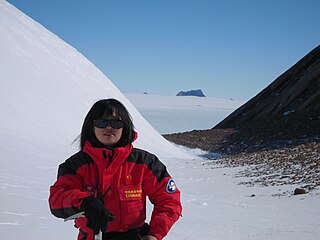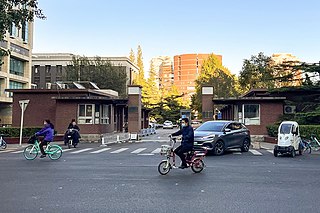Related Research Articles

Ding Zhongli is a Chinese geologist and officeholder, who is the chairman of the China Democratic League and a vice chairman of the Standing Committee of the National People's Congress.
Wuyi University is a public university based in Jiangmen, Guangdong, China.
Chen Ziyuan is a Chinese agricultural scientist and nuclear physicist. He is the main founding father of China's nuclear agriculture.
Wenying Zhuang is a Chinese mycologist. She is known for her contributions to the study of species diversity and phylogeny of Ascomycetes.
An Zhisheng is a Chinese geographer and politician who specializes in quaternary geology, air particle pollution control, and global change. He is internationally known for his studies on Chinese loess and its implication for paleo-climate and paleo-environment changes. He is a member of the Chinese Academy of Sciences and The World Academy of Sciences (TWAS), and Foreign Associate of the National Academy of Sciences. He is a researcher and doctoral supervisor of the Institute of Earth Environment, Chinese Academy of Sciences. He is a member of the Communist Party of China. He is an editor of Quaternary Science Reviews. He served as the Vice Chairman of International Union for Quaternary Research (INQUA) from 1999 to 2007, and the Vice Chair of International Geosphere-Biosphere Programme (IGBP) steering committee from 2003 to 2006.

Wei Lijie is a Chinese Antarctic researcher, best known for her work on the paleontology and stratigraphy of Tibet and the Antarctic.
Yan Dongsheng, also known as Tung-sheng Yen or T. S. Yen, was a Chinese inorganic chemist and material scientist. He was a fellow of the Chinese Academy of Sciences and the Chinese Academy of Engineering. He was a member of the Chinese Communist Party and Jiu San Society. He was a Standing Committee member of the 6th and 7th Chinese People's Political Consultative Conference.

Nankai Institute of Economics is an economic research institute affiliated to the Nankai University School of Economics. It is located within the university's Balitai campus at Nankai District, Tianjin. The institute was founded in 1927 by He Lian and Zhang Boling, was originally named Nankai Committee of Sociology and Economics. It changed its name into Nankai Institute of Economics in 1931, and then established the tenet of the institute, which is to "know China and serve China". The systematic social research that the institute has conducted was ahead of its time in China. The Nankai Price Index, compiled in 1927, was the very first price index in China and the most important reference to the study of Chinese economy during that time, indicating that it was rather influential and of high academic value. The institute was then regarded as the authority of Chinese economic studies during the period of Republic of China (1912–1949).
Chen Zhiming is a Chinese mathematician and the current director of the State Key Laboratory of Scientific and Engineering Computing and the Institute of Computational Mathematics and Scientific Engineering Computing.

The Institute of Physicsof the Chinese Academy of Sciences was the result of a merger, after the communist took control of the mainland China in 1949, between the Institute of Physics of Academia Sinica (IOPAS) founded in Shanghai in 1928 and the Institute of Physics of National Academy of Peiping (IOPNAP) founded in Peiping in 1929. The director of the IOPNAP, physicist Yan Jici, was appointed director of the new institution after the merger was completed in 1950. The new entity was named the Institute of Applied Physics before being renamed to Institute of Physics in 1958. In Taiwan, the IOPAS was re-established in Taipei in 1962 by another "founding father" of modern Chinese physics - Wu Ta-You.
Sun Binyong is a Chinese mathematician and an academician of the Chinese Academy of Sciences (CAS).
Wang Qiuliang is a Chinese scientist currently serving as a researcher and doctoral supervisor at the Institute of Electrical Engineering, Chinese Academy of Sciences. He is a member of the China Society of Electrical Engineering (CSEE) and China Electrotechnical Society (CES).
Shen Hongbing is a Chinese epidemiologist and oncologist, director of the Chinese Center for Disease Control and Prevention, and president of Nanjing Medical University from 2014 to 2021.
Jin Hongguang is a Chinese physical chemist, fellow of the Chinese Academy of Sciences.
Li Peng is a Chinese physiologist who is a professor at Tsinghua University, and currently president of Zhengzhou University. She is an academician of the Chinese Academy of Sciences. She is a member of the Chinese Communist Party.
Peng Yigang was a Chinese architect, and an academician of the Chinese Academy of Sciences.
Jiang Hualiang was a Chinese pharmacist who served as director of the Shanghai Institute of Materia Medica, and an academician of the Chinese Academy of Sciences.
Xin Zhou is a Chinese scientist specializing in magnetic resonance imaging. He is currently serving as president of the Innovation Academy for Precision Measurement Science and Technology of the Chinese Academy of Sciences since July 2022.
Yang Weicai a Chinese plant molecular geneticist, and academician of the Chinese Academy of Sciences, currently director and researcher of the Institute of Genetics and Developmental Biology, Chinese Academy of Sciences, and vice chairman of the Chinese Genetics Society.
Si Xingjian was a Chinese paleobotanist and stratigrapher. He is considered among the first generation of Chinese paleontologists. He was born in Zhuji, Zhejiang Province and graduated from Peking University in 1926 before earning his Ph.D. degree from the University of Berlin in 1931. He was a researcher and director of the Institute of Paleontology, Chinese Academy of Sciences and held positions as a professor at Tsinghua University, Peking University and the Nanjing institute of Geology and Paleontology. He was also a director of the Chinese Paleontological Society and member of the editorial board of the Journal of Paleontology and the Chinese Journal of Paleontology.
References
- ↑ Huang Huixian (黄慧仙); Li Shichao (李世超); He Dongjian (何冬健) (28 August 2020). 中国科学院院士、中国科学院南京地质古生物研究所研究员陈旭:建议在湖州建一所综合性大学. zjol.com.cn (in Chinese). Retrieved 2 March 2022.
- 1 2 陈旭院士. nigpas.cas.cn (in Chinese). 30 July 2009. Retrieved 2 March 2022.
- ↑ 陈旭. ckcest.cn (in Chinese). 20 December 2012. Retrieved 2 March 2022.